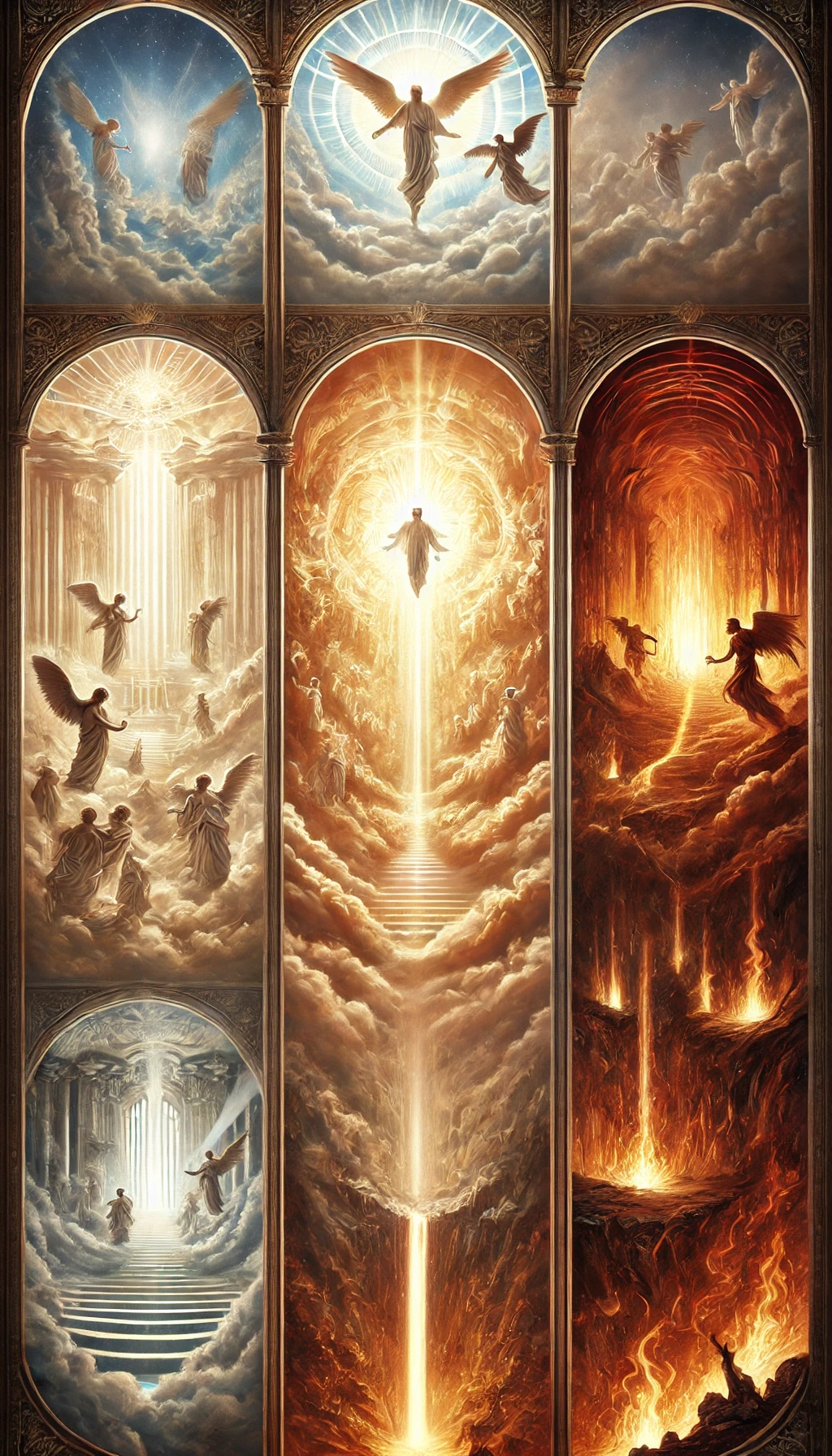
- Objection 1: It would seem that there is no need for distinct afterlife states of Heaven, Hell, and Purgatory. If God is all-loving and all-merciful, He would not permit eternal punishment or any intermediate state of purification; rather, all souls should be granted union with God immediately after death.
- Objection 2: Furthermore, some argue that scriptural references to fire, judgment, or separation from God are merely metaphorical and serve only as moral caution. Consequently, these references do not necessitate the existence of actual places or conditions such as Heaven, Hell, or Purgatory.
On the Contrary
- Scripture teaches that there is a place prepared for the blessed in the afterlife (John 14:2, New Revised Standard Version [NRSV]). Likewise, Scripture speaks of “eternal punishment” and “eternal life” (Matthew 25:46, NRSV), indicating the existence of a final separation between the righteous and the unrighteous.
- The Catechism of the Catholic Church (CCC) affirms that “those who die in God’s grace and friendship, and are perfectly purified, live forever with Christ” (CCC 1023). It also identifies Hell as the state of definitive self-exclusion from communion with God (CCC 1033) and teaches that Purgatory is a purification for those who die in God’s grace but still require purification to achieve the holiness necessary to enter Heaven (CCC 1030).
I Answer That
In the tradition of the Church, building upon Scriptural revelation and the consistent teaching of the Magisterium, it must be held that Heaven, Hell, and Purgatory are distinct realities pertaining to the state of the soul after death.
First, Heaven is the state of perfect communion with God, promised to those who, by God’s grace, have lived in charity and holiness. Jesus proclaims: “In my Father’s house there are many dwelling places” (John 14:2, NRSV), indicating the eternal reward for the righteous. This teaching is echoed in the Catechism, which emphasizes that souls in Heaven “see God ‘face to face’” (CCC 1023).
Second, Hell is affirmed by Christ’s own words regarding the “eternal fire prepared for the devil and his angels” (Matthew 25:41, NRSV). The Church teaches that this state of definitive exclusion from God’s presence is not imposed by a merciless God but is chosen by individuals who freely reject Divine grace (CCC 1033). Hell underscores the reality of human free will and the seriousness of moral choices.
Third, Purgatory is a state of purification for those who die in God’s grace yet still bear the temporal effects of sin and require sanctification (CCC 1030). As Scripture indicates, the process of purification is like fire (1 Corinthians 3:14–15, NRSV), testing the quality of each person’s works. In 2 Maccabees 12:46, prayer for the dead implies a belief in the need and possibility of postmortem purification.
Therefore, the existence of Heaven, Hell, and Purgatory is not merely metaphorical but is deeply grounded in Scripture and the consistent teaching of the Catholic Church, reflecting God’s justice, mercy, and respect for human freedom.
Reply to Objections
- Reply to Objection 1: God’s mercy does not negate divine justice or human freedom. While God desires the salvation of all (1 Timothy 2:4), individuals can reject grace through mortal sin. A loving God respects human freedom and allows for the natural consequences of one’s choices, which includes the possibility of definitive self-exclusion from the Beatific Vision (CCC 1033). Moreover, purgation respects the soul’s dignity and prepares it to enter into full communion with God, affirming rather than contradicting divine mercy.
- Reply to Objection 2: Scriptural passages on judgment and separation are not merely symbolic. While some imagery (e.g., fire, darkness) may be metaphorical, it conveys a real truth about the soul’s final destiny. Jesus’ parables (e.g., Luke 16:19–31) and the Church’s long-standing interpretation teach us that these warnings are grounded in reality. Thus, Heaven, Hell, and Purgatory must be understood not as mythical constructs but as states of being reflecting different relationships to God’s presence.
Conclusion
The doctrine of Heaven, Hell, and Purgatory is rooted in Divine Revelation, expounded by the Church’s teaching authority, and affirmed by centuries of theological reflection. These three realities express both God’s profound mercy and respect for human freedom, illustrating the range of possible relationships between the soul and God.
References
- Catechism of the Catholic Church. (1994). Catechism of the Catholic Church (2nd ed.). Libreria Editrice Vaticana.
- CCC 1023: On the immediate vision of God in Heaven
- CCC 1030: On the definition of Purgatory
- CCC 1033: On the nature of Hell
- Holy Bible, New Revised Standard Version. (1989). Division of Christian Education of the National Council of the Churches of Christ.
- John 14:2: Jesus promises dwelling places in Heaven
- Matthew 25:41; 25:46: Eternal fire, eternal punishment
- Luke 16:19–31: Parable illustrating the afterlife
- 1 Corinthians 3:14–15: Purification as through fire
- 1 Timothy 2:4: God desires all to be saved
- 2 Maccabees 12:46: Prayers for the dead suggest post-death purification